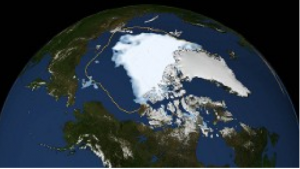
In September 2012, Arctic sea ice cover declined to a record low, over 3 million square kilometers below the long-term average for the month. Photo: IIASA Newsletter
IIASA researchers and Finnish policymakers and scientists met in May to outline a new research agenda addressing the challenges facing the Arctic region.
The seminar, jointly organized by IIASA, The Finnish Prime Minister’s Office, and the Academy of Finland, brought together stakeholders to share views, discuss and clarify the kind of Arctic research that is most needed to help guide the region through an uncertain future. Prof Markku Kulmala took part in the meeting, giving a Finnish view on climate change issues. Other speakers included Prof Pavel Kabat, Director of the International Institute for Applied Systems Analysis IIASA, Austria; Ambassador Hannu Halinen, Arctic Affairs at the Finnish Ministry for Foreign Affairs; Minister Counsellor, Deputy Head of Mission, Ulrik Tideström, Embassy of Sweden in Helsinki; Special Adviser Christine Daae Olseng, Coordinator for the Polar Research Programme, the Research Council of Norway; Senior Vice President and Chief Techology Officer Kari Knuutila, Outotec Oyj, Finland; Director Teija Tiilikainen, Finnish Institute of International Affairs, Finland; and Dr., Researcher Seija Tuulentie, Finnish Forest Research Institute.
“The meeting was an important step in establishing a real, efficient and useful dialogue between policy makers and scientists. Our Division is involved in many such efforts because we find it is in the best interest of society in every respect”, says Prof Kulmala.
Climate change has hit the Arctic region harder than any location on Earth. Over the last 30 years, the sea ice that covers the Arctic Ocean has declined by over 40% in summer, opening up new routes for shipping and making oil extraction and fishing more feasible in previously impassable waters. In the same time period, average temperatures have risen twice as fast in the Arctic as in lower latitudes. The resulting thawing of permafrost can undermine infrastructure, and the climate shifts may disrupt marine and terrestrial ecosystems, as well as the cultures that depend on them.
These changes open up new economic opportunities for resource extraction, shipping, and tourism in Arctic countries, but also pose many new questions about how to guide sustainable economic development and avoid environmental damage.
IIASA researchers focus on many issues relevant to the Arctic, including energy resources, air quality, and fisheries. The Institute also integrates scientific analyses into the assessment of policy options and future scenarios, a function that could be vital in the rapidly changing region, which is becoming ever more important on the global economic and geopolitical stage.
The meeting was webcast. For more information, visit the Academy of Finland Web site: http://www.aka.fi/arctic2013.
Tanja Suni
Adapted from IIASA Newsletter, Issue 14, June 2013
